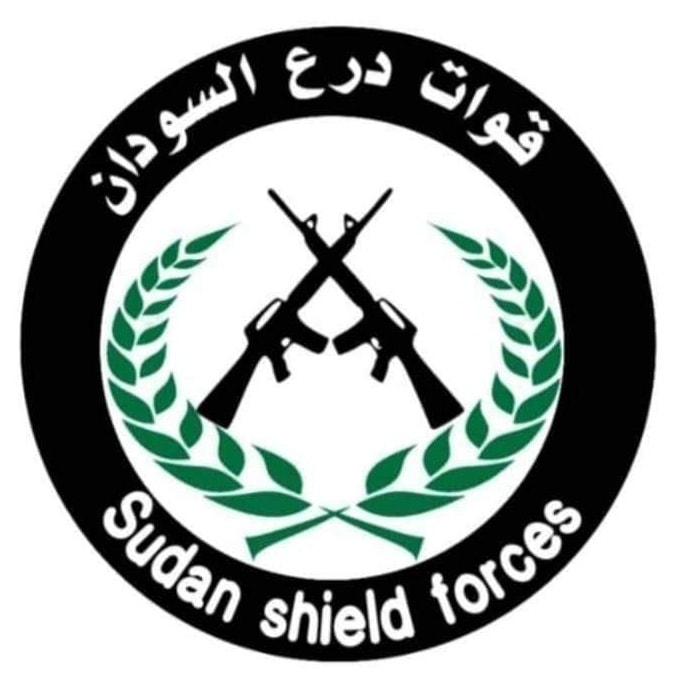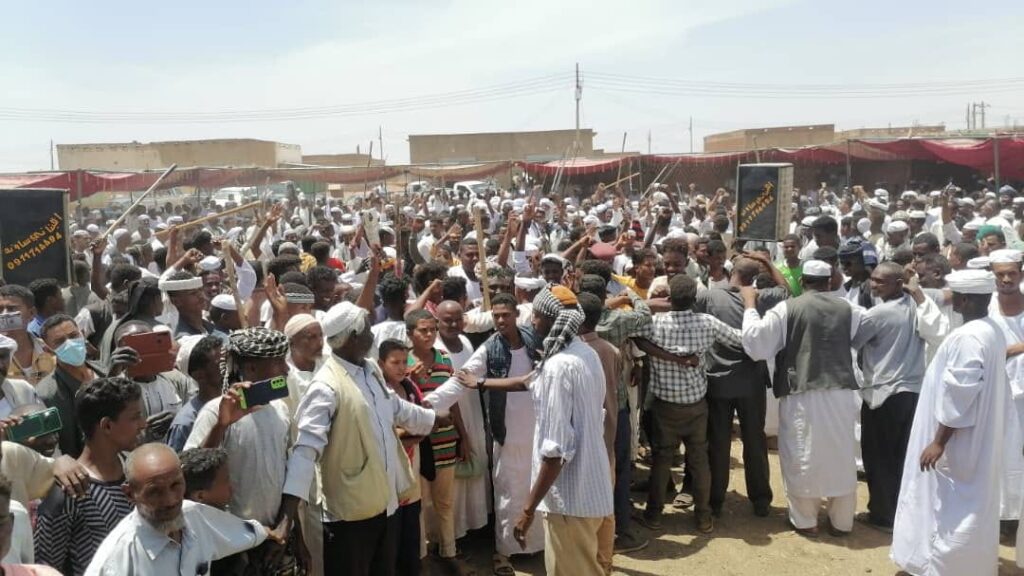Sudanese denounce Shield Forces ‘predatory recruitment’ as concerns over new militias grow

Sudan Shield Forces logo (Social Media)
DONGOLA / KHARTOUM – APRIL 7, 2023
Activists in Sudan’s Northern State have criticised the armament and recruitment operations carried out by the Northern Shield Forces, a militant defence group in the area consisting of elements of the defunct Omar Al Bashir regime, amidst growing concerns over the nationwide spread of the Sudan Shield Forces.
Political activist Adwa Kashif told Radio Dabanga yesterday that the recruitment process was met with widespread rejection by residents in the Northern State. “Arming one group over the other could lead to confrontations between them,” she warned.
Activist Hatem Hasan confirmed the Northern Shield Forces’ recruitment actions. “The group is trying to recruit young people from various regions working in the mining markets,” he told Radio Dabanga.
This poses a danger to the “social fabric in the state and threatens the unity of the country,” he warned.
“Recruitment operations outside the official armed forces could lead to civil wars, as is happening in some countries such as Yemen and Iraq.” Hasan urged all parties “to focus on what unites the country, rather than what threatens its unity”.
‘Recruitment operations outside the official armed forces could lead to civil wars’
New militias
Retired Sudanese Navy Lt Col Omar Arbab recently accused the Sudan Armed Forces (SAF) of involvement in the formation of new militias such as the Homeland Shield Forces and the Sudan Entity Forces and warned of the dire consequences of this approach.
A recent report by journalist Um Zein Adam for the Sudanese El Demoqrati newspaper also covered the events. She wrote that, when listening to the statements of SAF Commander and de facto government leader Lt Gen Abdelfattah El Burhan, he always says that he is in support of a civilian government and the army’s exit from the political process.
“On the ground however, since the coup, tribal groups have been working to form armed forces in areas that have not witnessed any armed conflict before, in the north and centre of the country, the latest of which is the Sudan Shield Forces that announced themselves in mid-December without the authority taking any action against their formation.”
In February, Radio Dabanga reported that the Sudan Shield Forces indeed continue their movement in the central regions of the country as well, as they announced an ‘enlightening meeting’ in the Hatab Market in Khartoum North end of February. They have held rallies in various other places in Sudan.

A military expert told Radio Dabanga that the establishment of the Sudan Shield Forces and the fact that they appear at this time in central Sudan in large numbers and have even occupied markets “indicates support by a specific party”.
He accused the defunct regime of Omar Al Bashir of standing behind the establishment of the forces and explained that the method of establishment is similar to that of the Rapid Support Forces, Sudan’s largest paramilitary that is widely held responsible for many atrocities in Sudan, especially Darfur.
In an interview with El Demoqrati newspaper, political analyst and journalist Mahdi Rebeh stated that the Sudan Shield forces and other militant groups are the work of the defunct regime.
The fact that the new forces are able to move and spread so widely “indicates the absence of the state and the absence of armed forces based on a unified doctrine to protect the country,” the military expert told Radio Dabanga.
‘Sudan has become a state of militias’
He described the matter as dangerous and a major threat to the existence of Sudan as a state. Like the activists and Lt Col Arbab, the expert warned of the dire consequences of the formation of such new militias.
“Sudan has become a state of militias” where access to power requires the possession of militias, he said.
To get out of this crisis, Sudan requires the unity of the Sudanese people to put pressure on the military to accept a civilian government during the transitional period with full powers so that it can resolve these phenomena, he said.











 and then
and then